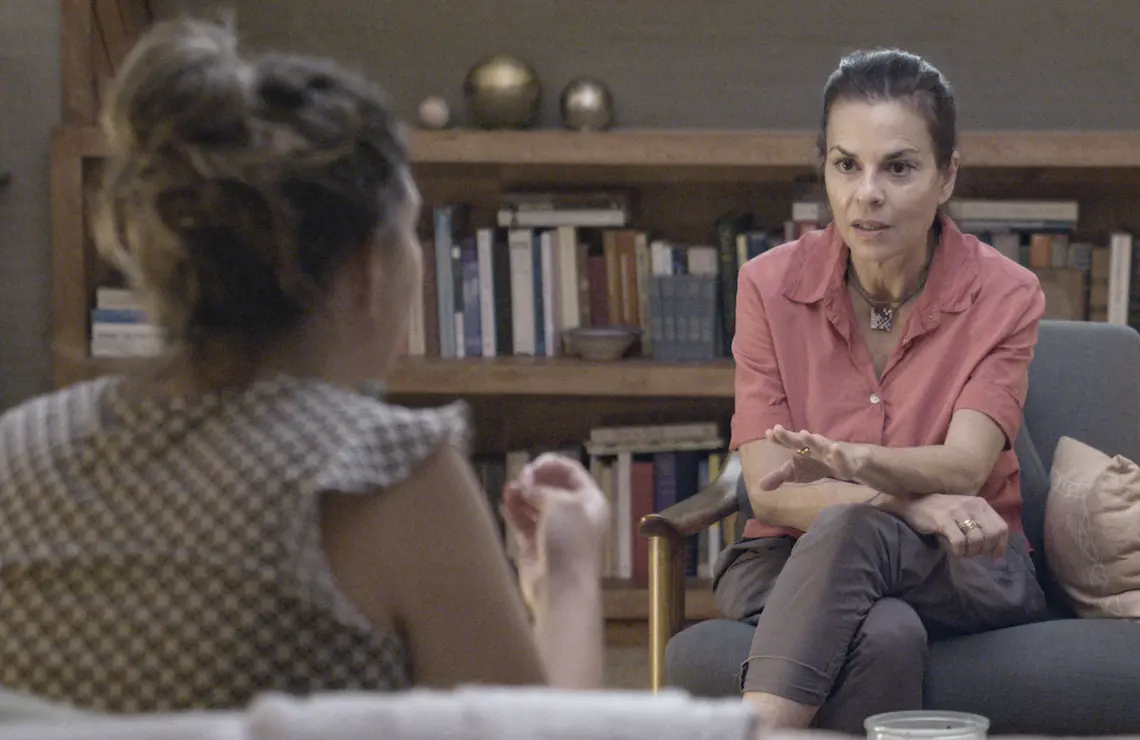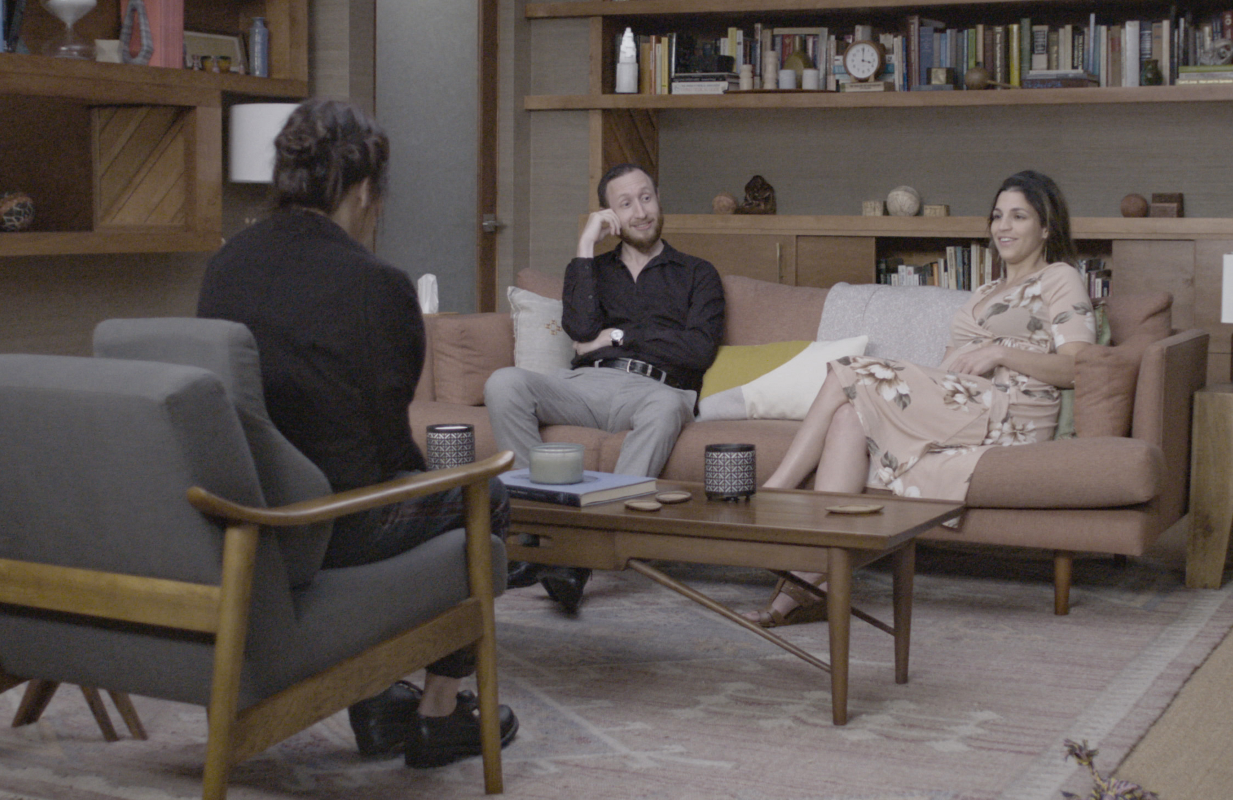Showtime's Couples Therapy May Be the Best Show You're Not Watching
-
 Dr. Orna Guralnik in Couples Therapy (Showtime)
Dr. Orna Guralnik in Couples Therapy (Showtime)In the opening montage of Couples Therapy's Season 2 premiere, we ride along on the back of Nico, Dr. Orna Guralnik's Alaskan Klee Kai, as she traverses the streets of New York and ends up in her dog bed in Orna's office. We then see a wide angle that includes Nico as she sits in on sessions with Orna and the show's participants — greeting them as they arrive, reacting to fights, and nesting under the couch upon which the participants sit. As metaphors go, it's a little blunt, but like Nico, I am very happy to take up my position in Orna's office and take it all in for another season.
On Showtime's Couples Therapy (not to be confused with VH1's Couples Therapy With Dr. Jenn), clinical psychologist and psychoanalyst Orna works with three couples seeking to address issues in their relationships. Michael and Michal have been married for eleven years and are parents to a couple of children; she would like to be pregnant again, but worries that they can't afford it, and blames their money problems on Michael's lack of initiative and ambition. Tashira and Dru have been together two years; she got pregnant when they'd only been dating a short time, and sometimes feels their life together was thrust upon them because of their circumstances, for which she is somewhat resentful of him. Gianni and Matthew have been together three years; Matthew is newly sober, and they're both trying to navigate this change in their lives and how they relate to each other. (While Orna appeared in the show's first season, all of Season 2's couples are new.)
Therapy as a practice has been bastardized by reality TV in shows like Marriage Boot Camp, The Mother/Daughter Experiment, the aforementioned VH1 take on Couples Therapy, and pretty much anything Drs. Phil and Drew have ever put their grimy hands on — so if this was a title that immediately turned you off when you heard it, I get it. But it really is different. It's not exactly reality TV, for starters; it's more of a docuseries, and comes from documentary filmmakers Josh Kriegman and Elyse Steinberg (Weiner). Sessions are filmed in a specially designed office with cameras hidden behind two-way glass, so that the filmmaking process is invisible to the couples while they work with Orna. Discussions are allowed time to unfold naturally, without quick cuts, frankenbites, or talking head interviews interrupting the flow and shaping the narrative. It's not salacious or grubby — and don't get me wrong: those kinds of shows have their place and their function; please see my passionate endorsement of Married At First Sight. Couples Therapy is just a very different experience.
Format aside, a big component of what makes Couples Therapy so engrossing is Orna. Adorned with a variety of statement necklaces, she fixes the participants with her gaze, eyebrows attuned to their micro-expressions and especially to everything they're trying not to say. Orna is gentle but firm, guiding her charges to insights and breakthroughs in safe stages. We also see her in conversation with her own advisor, Virginia Goldner, discussing both the specific issues her participants are working on this season, and making general observations about couples therapy — how sessions aren't always about solving problems but about seeking "justice"; how a fight with a partner may actually have started as a fight with a parent decades earlier.

Orna's office "studio" is in New York City, and at the end of the second episode, we hear a news report in which Governor Andrew Cuomo confirms the first case of COVID-19 in the city. After that, we see Orna's placed a bottle of hand sanitizer in her waiting area... but then midway through the third episode, the city goes into lockdown. Orna starts holding sessions remotely, and we immediately see how integral her use of the physical space in her office is when she's no longer permitted to occupy it. Michael and Michal are especially fractious, and as the two of them bicker, they completely ignore and possibly don't even hear Orna's attempts to redirect them; she later tells Virginia how frustrated she is by the technology, and how it leaves her on the outside of the intimacy the couples still have, being in the same space together. As one might expect, the pandemic not only exacerbates problems the couples were having but introduces new ones — excessive proximity; stress over job loss; Gianni's fears for his family in Italy.
A particularly underrated element of this underrated show is the interstitials of couples — and people, generally — living life in New York. Rarely, these have a How To With John Wilson-esque wit in the way they match up with narration, as when Orna's comment about couples creating their own private universes plays over bubble-shaped outdoor dining tents, but mostly it's just footage of anonymous people being tender, prickly, or sweet, unaware that they're being observed. If you've missed people-watching over the past year, these brief vignettes may quench some of that thirst.
Unscripted TV — particularly shows about relationships — is often built on schadenfreude; we watch for the train wreck, the scandal, or the scandalous train wreck. But Couples Therapy is doing something so fascinating and special: hooking the audience with real people's honesty and vulnerability, making us root for them to get their trains back on track, and showing us how hard that work is to do. The season is just nine episodes, none more than half an hour long; it may be the most rewarding thing you'll watch this year.
Couples Therapy returns to Showtime Sunday April 18 at 10:00 PM ET
People are talking about Couples Therapy in our forums. Join the conversation.
Writer, editor, and snack enthusiast Tara Ariano is the co-founder of Television Without Pity and Fametracker (RIP). She co-hosts the podcasts Extra Hot Great and Again With This (a compulsively detailed episode-by-episode breakdown of Beverly Hills, 90210), and has contributed to New York, the New York Times magazine, Vulture, Decider, Salon, and Slate, among many others. She lives in Austin.
TOPICS: Couples Therapy, Showtime, Orna Guralnik